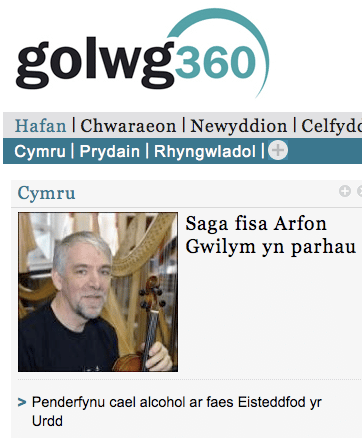
A Welsh-language news website that’s getting £600,000 in public funds will be reviewed next year, the Welsh Assembly Government’s heritage minister says. Golwg360 won the £200,000-a-year, three-year allocation in 2008 and launched last month – but some readers have criticised the quality of the output, and we think the possible extinction of ITV (LSE: ITV) regional news puts the whole issue of funding regional public service media back in play.
Plans for the site date back to 2006, when private startup Dyddiol Cyf began planning for Y Byd (The World) – an international daily newspaper and website in Welsh with 24 reporters. The idea was to finance the title through private investment, cover sales, European funds and any available assembly grants – but the project collapsed a year later after attracting too little investment and being overtaken by political agendas…
In a June 2007 coalition deal to prop up the Labour government, Plaid Cymru won a commitment to grant £600,000 of public money over three years to a new print/online title. Rather than hand the cash to Y Byd, the government held a beauty contest. icWales/Western Mail publisher Trinity Mirror (LSE: TNI) was amongst contestants, but the money went to existing monthly magazine Golwg, which used it to create Golwg360. The new site has seven staff, including four journalists, and must write 10 news stories per day between them.
But one exec told me: “Technically it’s terrible. The quality of the articles is poor – people would rather see just two articles a week that really investigate and question issues than rewritten wire copy. It doesn’t live up to any of the aspirations of what a 2009 site should be, it’s been a wasted opportunity.”
Answering questions from a Conservative member last week, culture minister Alun Ffred Jones said the site – which was conceived along with the online arm of Question Time producer Mentorn‘s parent Tinopolis – paid £25,354 in consulting fees to Narrowstep founder and ex CEO Iolo Jones and has now “stabilised” following “considerable technical problems”. The minister said the terms of the grant had always stipulated for a “full formal review of the project in the summer of 2010“.
By then, the wider future of regional media funding – which is currently in flux – could already be settled. Foreshadowing the end of ITV regional news, the Digital Britain report has invited an eclectic mix of alternative providers to bid for funds to run multi-media news operations. Just as GMG and Ten Alps are amongst those interested elsewhere, S4C wants to pilot an English-language Wales service, but it may not be the only contender.
If Welsh-language public media is drawn in to the consulting on funding an English-language ITV replacement, and if a review of Golwg360 were to revoke its remaining funding, the effort to fund a new multi-media provider may be boosted by the £200,000 to £400,000 left to run on Golwg360.
And could Y Byd still be a candidate? With its bank account still active, its shareholders in January voted to remain active, still aiming to “publish a multi-platform newspaper when this becomes possible”.
How will the review go? The minister maintained that Golwg360 “is the only Welsh-language website which gives regular coverage of international news” – but that may raise eyebrows at the BBC, whose own Welsh-language news site has been doing so for several years.